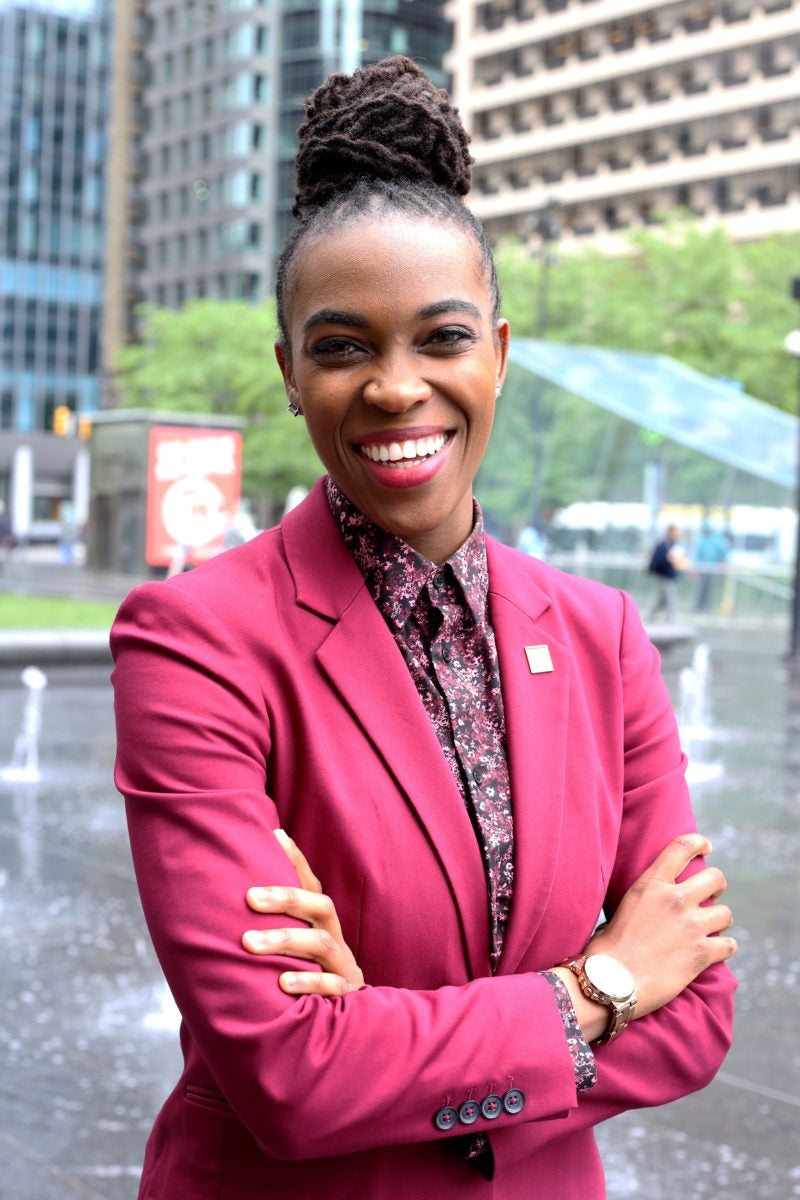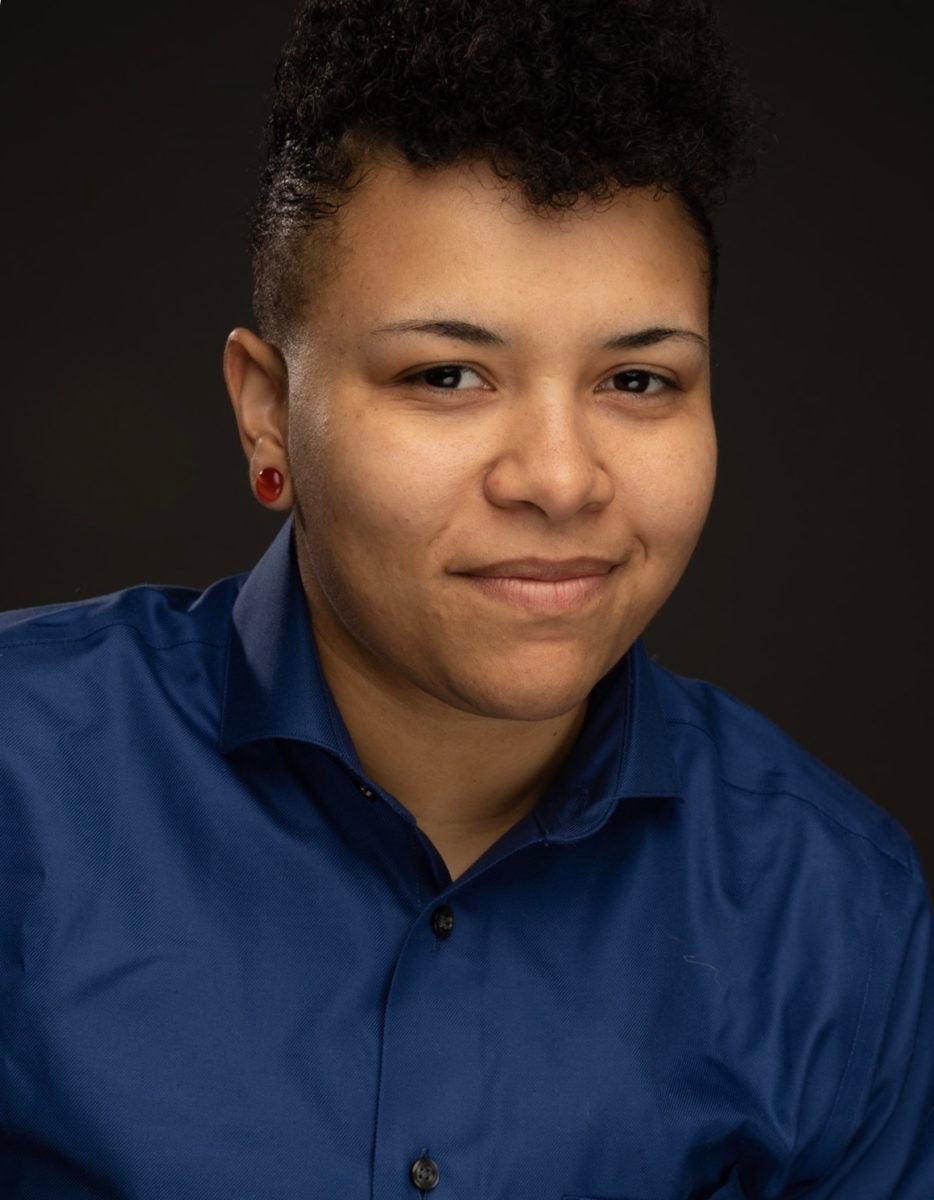The Office of LGBT Affairs in the Philadelphia Mayor’s Office is run solely by two, Black, queer women, Executive Director Amber Hikes and Deputy Director Evan Thornburg.
Under Hikes’ and Thornburg’s leadership, the office has been committed to not only serving Philadelphia’s LGBTQIA+ community, but also highlighting and elevating the experience of marginalized folks even within that already marginalized community.
“If I’m being candid with you, I think it’s different from the way the work has been done in the past, and I think it’s important again, in this political context, in this historic context,” Hikes, 35, told ESSENCE during a phone interview earlier this month. “We are being very intentional about the experiences of immigrants, of people with disabilities, of elders, of young people, of people of color, of women, of trans and non-binary, gender non-conforming folks, and all within the LGBTQ community. Our work is not just about queer people, it’s about folks that are living along the margin.”
Both women joined the office in 2017. Hikes was tapped as executive director in March 2017, with Thornburg joining her seven months after, and it’s critical to note the political and historical context at that time. This was right after the November 2016 elections, right after Donald Trump officially became president, at a time, as Hikes put it, “our marginalized communities then and still, were feeling very targeted, very attacked and could tell their protections were being rolled back and very intentionally stripped away.”
The office then, was not meant to be just a policy office, but one rooted in the community.

None of the women come from a political background. Both of their backgrounds are in education, Thornburg specifically is a diversity expert specializing in training on LGBTQ identities and intersectionality, with Hikes also having a background in social work. This is a difference both women think the community can feel, as they approach their work from a different context.
Hikes made waves in the very beginning of her tenure for pushing to include black and brown stripes on the traditional rainbow Pride flag to represent people of color, a symbolic representation of all the conversations, protests, boycotts and hearings that were being held in Philadelphia surrounding the issue of racism within the LGBTQ community, and a true symbol of diversity and inclusivity.
Together, the women have worked tirelessly on educating and competency building in the city. Thornburg, as lead trainer is especially proud of the training that has been done to redesign sexual harassment policies and sexual harassment training in the city, that has made it not only more competent but more inclusive.
“I don’t think you’ll see sexual harassment training like the city of Philadelphia is going to be mandating,” she said. “We’ve also intentionally made sure to recognize things like non-sexual interest, sexual harassment is a thing and what that looks like. A lot of people think about sexual harassment as intentionality or interest and it’s sometimes also just about asking really invasive and pervasive questions about someone’s body, once you find out that they’re trans. It’s about asking about what role people play in their relationships if they’re in a same gendered or same identified relationship.”
And that’s just barely skimming the surface.
This is why they also think they are perfectly poised to do the work that they do – not only to take up an important seat at the famed table, but to make sure people from the communities they represent and defend are able to have a seat, too.
“Still, too often, the powers that be are making decisions about people without having those people represented in the room…and having some kind of control over their own lives,” Hikes said. “What I think is particularly important about queer, Black women doing this work…is that not only are we able to speak up for the communities that look like ours, but because we are who we are, we also are uniquely attuned to the experiences of other marginalized identities, even if they’re not our own.”
“I think sometimes being the person who’s able to point out the elephant in the room and say, ‘well, we’re here talking about opioids and we’re talking about addiction, but there’s nobody in this room who’s going through addiction’ [is important],” Thornburg added. “Sometimes it’s not just about the power I’m able to create in this way, like clearing a path, I think it’s also my being in this position and being in a room where I can say, ‘these folks need to get out of their chairs, or I will get out of my chair.’”
This is the difference Hikes explained, between ally-ship and accomplice-ship, something that was referenced a lot throughout the conversation.
“It’s the difference between, standing in ‘solidarity’ with someone and then using your actual power and privilege to dismantle systems,” Hikes said.

“Ally is a verb, it’s not a noun,” Thornburg added. “Being an accomplice [is] knowing the nuances of when to use your privilege or use your body to protect somebody; know when to pull yourself back and to put somebody’s voice forward, and to know when you have to go with them on the journey, that requires that you see them struggling with something and you are buttressed against them and you are not going to let go.”
Another important goal of the office is to prepare for the future, not only through the various trainings, but through a recently hatched Leadership Pipeline Program meant to ensure that diversity and inclusion continue to be the norm, so that the room that we are all sitting in doesn’t look the same as it did five to 20 years from now.
“In addition to the policy and the advocacy, the community engagement, education and training that Evan does, we started this LGBTQ leadership pipeline initiative to specifically address the issue of the lack of diverse representation on the boards of our LGBT organizations in this city,” Hikes said. “The LGBTQ community in general has done a pretty bad job of capacity building and succession planning. It’s literally just the folks that have been leading the community are the same ones that have been leading for the last 40 years.”
The office has been working on the pipeline over the last six months and currently have 20 participants of various identities – including people of color, trans folks, elder folks, young folks, and people with disabilities – in order to continue ensuring there’s a seat at the table. These new leaders are slated to join the boards of the LGBT organizations in Philadelphia at the beginning of July, Hikes predicts.
“We worked our hardest to eliminate typical challenges, both financial and social, attach challenges to board participation and we’re so excited to be able to say, that not five, 10 years down the road, but literally this year, we have dramatically changed the leadership landscape in this city,” she added.







And this is truly what the work is about, creating space for those who for too long have gone unnoticed and unheard, ensuring that there is access to resources and protections to keep people safe regardless of their identities, to make tomorrow better than yesterday.
“I really like working on behalf of the greater good,” Thornburg said. “If I’m going to get up every day and put my blood, sweat, and tears into something, I want it to be meaningful, and I want it to have impact, to make the day afterwards that much easier for whomever, not just me, but folks all over.”
“My mom before she passed, talked so often about the responsibility of those of us who get over the wall, to throw the rope back. I’ve heard people getting through the door and holding it open, for those that are coming behind you,” Hikes added. “I think that’s basically kind of the greatest legacy that any of us can have, is using our space and using our privilege to create more space for those who are coming behind us that haven’t had that opportunity. If there’s anything that I can leave as a legacy is that there’s more folks who have access to these spaces that didn’t have them before I got here.”


